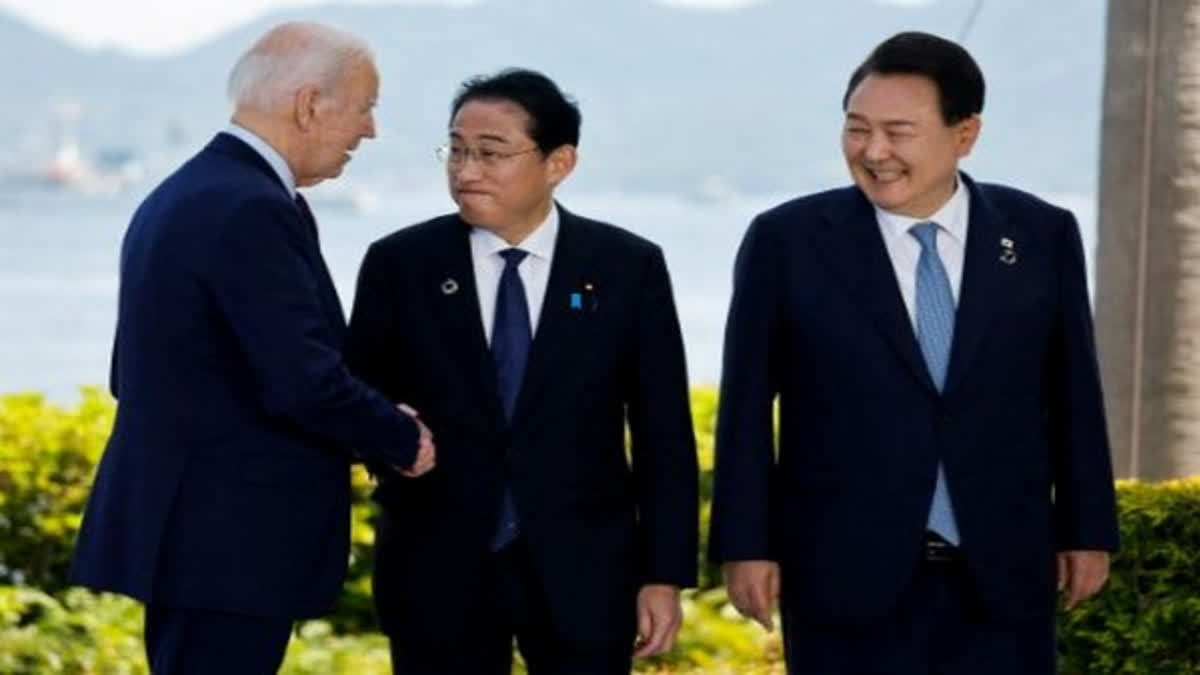New Delhi: With a trilateral summit scheduled to be held on Friday in Camp David between the US, Japan and South Korea, Seoul’s role in the Indo-Pacific region has again come under focus. Ahead of his visit to the US, South Korean President Yoon Suk Yeo said in a televised speech in Seoul that the summit “will set a new milestone in trilateral cooperation contributing to peace and prosperity on the Korean Peninsula and in the Indo-Pacific region”.
In December last year, South Korea unveiled a new Indo-Pacific strategy that observers say aligns with the strategies of India, the US, Japan and Australia, who are part of Quad that is working for a free and open Indo-Pacific in the face of China’s hegemony in the region. In its new strategy, South Korea pledged to bolster the regional rules-based order to protect freedom, democracy, and human rights. The document expands on President Yoon’s previous promises to accept greater responsibility for defending democratic principles and is consistent with the national security strategies of the US and its allies. However, it held back from unambiguously defining the Chinese threat in the region to the same extent that Washington, New Delhi, Tokyo, and Canberra have.
“South Korea definitely worries about what China is doing in the Indo-Pacific,” K Yhome, Fellow in the Asian Confluence think tank and who specialises in Indo-Pacific issues, told ETV Bharat. “But, it stays in the background as it does not want to be seen as countering China. South Korea wants its role to be seen in the economic areas rather than to be seen as being in the camp of the US.”
Despite being a formal ally of the US under the 1953 Mutual Defence Treaty, South Korea has deep-rooted economic linkages with China, which is its largest trading partner with a Free Trade Agreement (FTA) in place since 2015. “These factors had compelled the erstwhile government in Seoul led by Moon Jae-in to avoid antagonising China and accommodate its rise through a cautious posture of strategic ambiguity,” writes R Vignesh, Research Analyst at the Manohar Parrikar Institute of Defence Studies and Analyses.
According to Vignesh, South Korea’s Indo-Pacific strategy indicates the Yoon government’s clear departure from this strategic ambiguity. “The strategy illustrates Seoul’s strategic alignment with Washington’s IPS (Indo-Pacific Strategy) which is firmly rooted in preserving the rules-based international order and promoting democratic values,” he states.
Referring to Friday’s trilateral summit, Yhome said that South Korea’s main driving force to deepen security cooperation with the US and Japan is to deal with the nuclear threat from North Korea. “Both South Korea and Japan have been US allies for a long time,” he said. “The fact that South Korea wants to take its relationship with the US and Japan to a higher level indicates that it is facing bigger threats from North Korea.”
Though Seoul, Washington and Tokyo have held trilateral summits several times in the past, these were always on the sidelines of other international summits. This is for the first time that such a standalone summit is being held. “Japan is conservative in defence cooperation with other countries,” explained Yhome. “But it is engaging in a deeper defence relationship with South Korea is a sign of the two countries coming together in the face of the aggressive nature of China.”
He further said that the trilateral defence cooperation between South Korea, Japan and the US is in line with the strategic framework in the Indo-Pacific led by the US and reflected by the Quad. It very much aligns with India’s Indo-Pacific policy and is a welcome gesture, he added. “Japan and South Korea deepening their ties even in the defence and security sector is a good sign for India,” Yhome said. “That will send a very strong message to China.”



